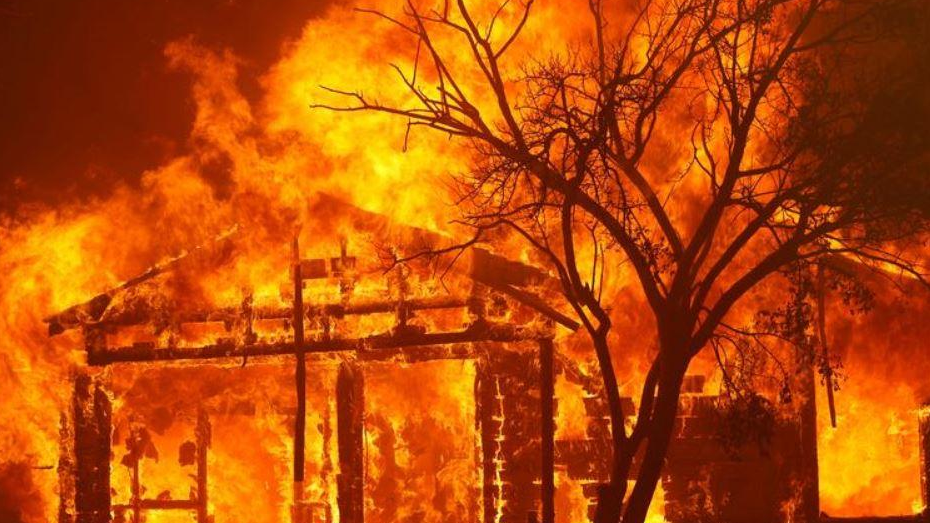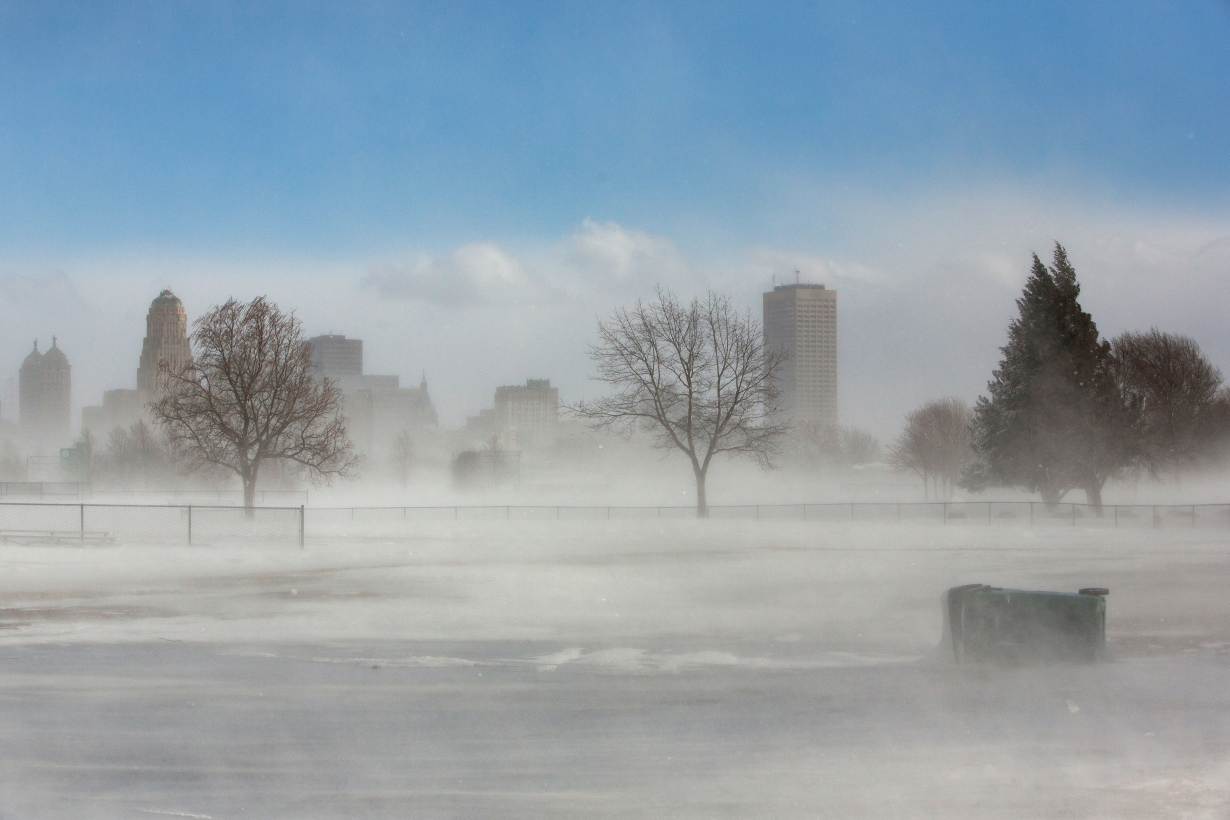
California is on fire, Louisiana is drowning. During the summertime, these extreme weather events were just as polarizing as American politics with the November election approaching.
"Nowhere in America"
The darkened, smoggy skies with an eerie orange glow seem straight out of a Hollywood flick. Yet, the apocalyptic scene has become a reality witnessed by hundreds of thousands of residents living on the U.S. West Coast as record-breaking wildfires ravage forests from California to Washington.
By Tuesday, some 8,000 wildfires had destroyed 3.6 million acres in California, according to the state's forestry department. Some 6,400 buildings have been destroyed in an early estimate, which, however, falls far short of the real figure. Currently, some 18,700 firefighters are battling 27 major wildfires, including the fiercest August Complex fires.
"After a few calm weather days, fire activity on the extremely large wildfires still burning throughout California is slowly picking up again. Air quality [is] starting to worsen in some spots as smoke increases," tweeted Daniel Swain, a climate scientist at the University of California, Los Angeles.
The sun parches the field; people are coughing in plumes of smoke; the state electricity grid crumbled from time to time due to blistering heat. The mountain fires have killed at least 26 people and forced approximately 23,000 people to leave their homeland.
While California burns, some 1,900 miles away, Hurricane Laura has killed at least 25 people as it tears through Louisiana. Governor John Bel Edwards warned that it was even more powerful than Hurricane Katrina – the destructive 2005 storm which left more than 1,800 people dead. After Katrina, some 250,000 evacuees moved west to Houston, a five-hour drive away. By October 2015, about 100,000 of them had made the fourth largest U.S. city their home and became part of Houston's socioeconomic fabric, according to the Houston Chronicle.
However, Houston might not be a safe haven this time around amid Laura's rampage as Storm Beta, in addition to Laura, is threatening to inundate the city. Numerous families are left in either blackouts or with poor Wi-Fi connections in these torrential downpours which are gaining strength every year.
Almost nowhere in America is left unscathed. Phoenix, Arizona, is experiencing a baking heat of 114 Fahrenheit (45.6 degrees Celsius), unseen in 75 years. Drought-blighted Alabama has seen a poor harvest of its oldest cash crop – cotton lint. From Florida to North Carolina to Maine, the sea level is ever rising, which means there'll be less fresh water and the places will be no longer inhabitable.
People are migrating, to the north, to the inland, or to safer nearby suburbs. The climate-induced migration has long begun, but received little attention until things became unmanageable in the summer of this election year.

The city skyline is seen in drifting snow during the polar vortex in Buffalo, New York, U.S., January 31, 2019. /Reuters
The city skyline is seen in drifting snow during the polar vortex in Buffalo, New York, U.S., January 31, 2019. /Reuters
Climate migrants vs. American politics
In 2019 alone, more than 1.2 million Americans were displaced because of climate catastrophes. The figure is only expected to rise. About 162 million Americans – half of the country's population – will most likely experience a decline in the quality of their environment, according to a New York Times analysis based on climate data modeling.
In the 2016 election year, more than 30 percent of Americans said climate change should be a top priority for the president and Congress, but in 2020, it's over 50 percent.
Statistics from Stanford University, Resources for the Future and Reconnaissance Market Research show that 81 percent of Americans believe that the Earth's temperature has increased in the last century – that constitutes a rise by a large margin over the years.
At a time when people have to take into serious account migration for good, climate change is no longer an issue traditionally followed by Democratic voters. Evidence shows that it is likely to take center stage in this year's presidential election. Some 77 percent of younger Republicans are leaning to their Democratic counterparts in taking climate change as a serious threat.
Among the key factors that play a role in the upcoming election, climate change ranks the third most important, trailing COVID-19 and an anemic economy further affected by the unfolding pandemic, according to an NPR/PBS NewsHour/Marist poll released a week ago.
When human life is becoming unbearable for a larger proportion of the population, climate migration seems to be an ideal alternative. But leaving home for a livable place is not a panacea.
Climate-related migration will further exacerbate gentrification, as in most cases, only the rich could afford the move without government subsidies or home insurance. A widened wealth gap will leave behind more low-income families on the brink of an environmental collapse.
Moreover, climate migration, as warned by the World Bank, will probably cause competition for job opportunities and societal resources. By then, social injustice will become a bigger headache for politicians.

Protesters carry signs during the People's Climate March at the White House in Washington, U.S., April 29, 2017. /Reuters
Protesters carry signs during the People's Climate March at the White House in Washington, U.S., April 29, 2017. /Reuters
Zero in on election
A poll conducted by the Pew Research Center in late 2019 found that roughly two thirds of all U.S. adults thought the federal government wasn't doing enough on climate change. The same proportion of Americans want to see "more aggressive action" from the government in a June poll.
But Republicans reiterate addressing climate change is too costly, despite a shift in attitude among the party's younger cohort.
After U.S. President Donald Trump descended into a smoky Northern California in mid-September, he promptly concluded that inadequate forest management was to blame. During a briefing with Governor Gavin Newsom, Trump told state officials that the climate will "start getting cooler."
"I don't think science knows, actually," he said.
His comments went against the consensus of the scientific community, which has largely established links between global warming and the increased number as well as intensity of wildfires around the world in recent years. Even Trump's allies thought his view of the issue was out of touch.
"I would encourage the president to look at the science, admit that climate change is real, and come up with solutions that do not destroy the economy like the Green New Deal," U.S. Senator Lindsay Graham, a close Trump ally, said during an event last year.
The Trump administration has taken a 180-degree turn from the Obama-era policies and cleared major legal roadblocks for oil and gas companies whose operations pose a major threat to the environment.
Just two weeks before the start of the Republican convention in late August, Trump handed another gift to the fossil fuel industry by rolling back the last major environmental regulation enacted under the previous Obama administration. Under the new rule, oil companies no longer have to detect and repair methane leaks, a major greenhouse gas that absorbs the sun's heat and warms up the atmosphere.
While hailing "American energy dominance," Trump also rolled back auto emission standards, resisted air pollution measures and opened the wildlife refuge in Alaska to natural resource exploitation, all within the span of 2020.
Meanwhile, as vice president under Obama, Joe Biden has a drastically different take on environmental issues compared to Trump. His campaign has promised to set aside 2 trillion U.S. dollars to be spent over his first term in office. The package will support clean energy projects and help achieve net-zero emissions by 2050. But every U.S. election in the past few years has upended convention, along with both parties' policies.
(Cover photo: Protesters carry signs during the People's Climate March at the White House in Washington, U.S., April 29, 2017. /Reuters)